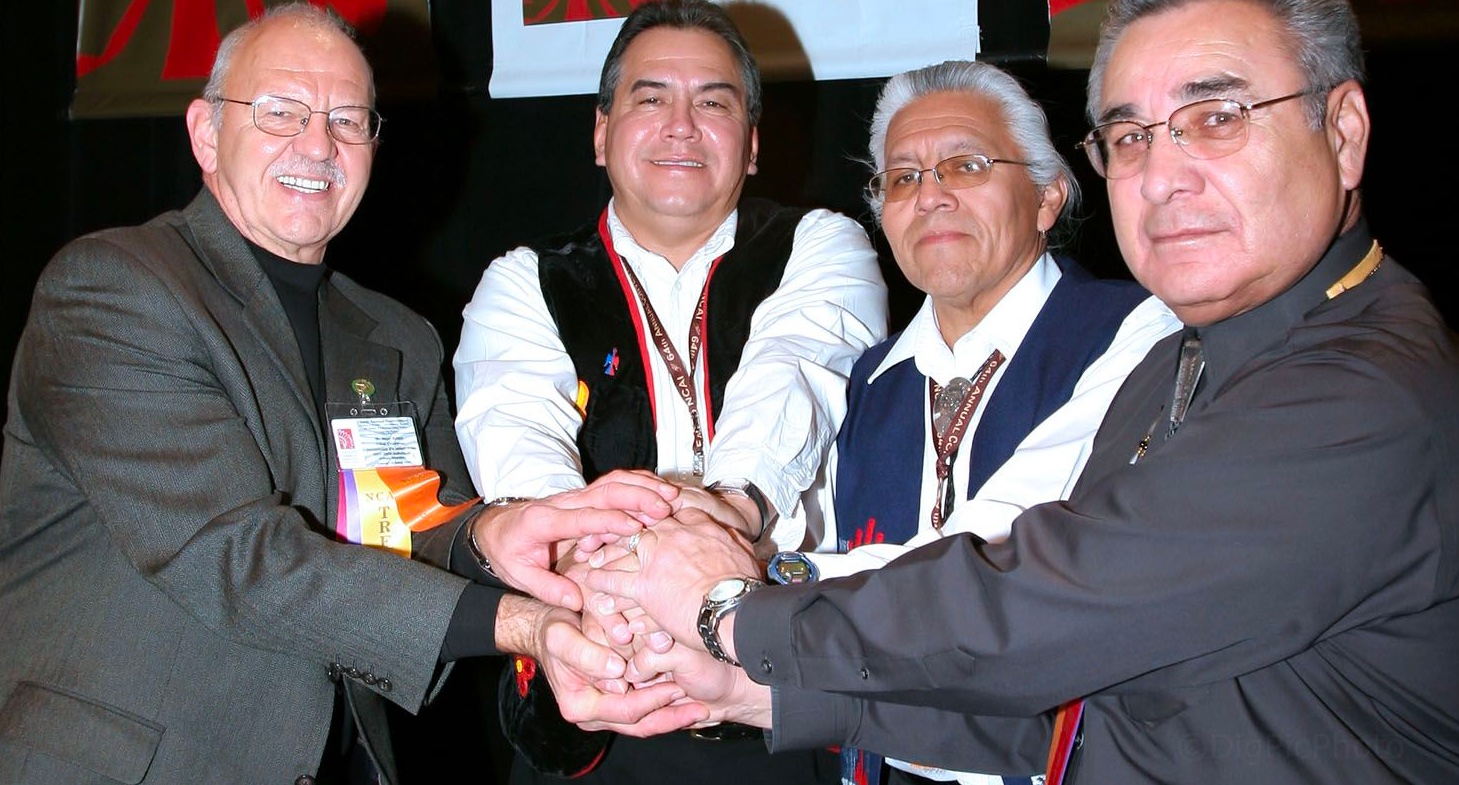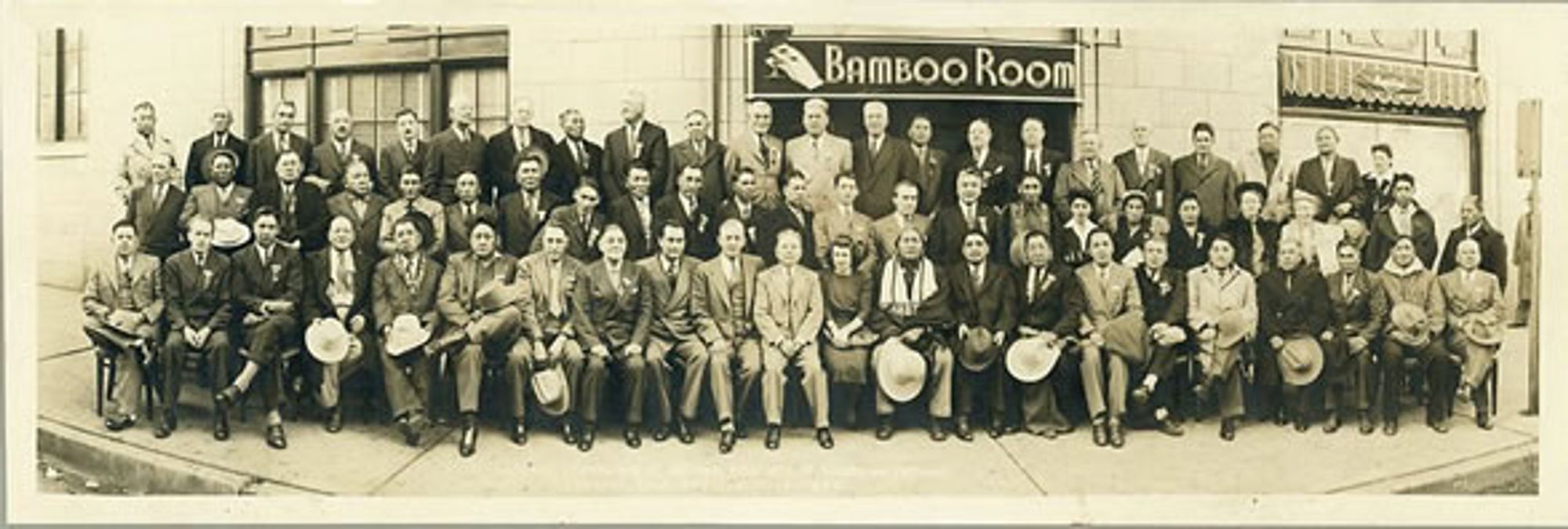About NCAI
Table of Contents
Historic Overview of NCAI
The Unified Voice of Indian Country
Since 1944 NCAI has served as the unified voice for American Indian and Alaska Native Issues.
Founded in 1944, the National Congress of American Indians (NCAI) is the oldest, largest, and most representative American Indian and Alaska Native organization serving the broad interests of tribal governments and communities.
NCAI, a non-profit organization, advocates for a bright future for generations to come by taking the lead to gain consensus on a constructive and promising vision for Indian Country. The organization’s policy issues and initiatives are driven by the consensus of our diverse membership, which consists of American Indian and Alaska Native tribal governments, tribal citizens, individuals, and Native and non-Native organizations.
For nearly seven decades since its founding, NCAI has remained true to the original purpose of the organization: to be the unified voice of tribal nations. As outlined in the NCAI Constitution, our purpose is to serve as a forum for unified policy development among tribal governments in order to: (1) protect and advance tribal governance and treaty rights; (2) promote the economic development and health and welfare in Indian and Alaska Native communities; and (3) educate the public toward a better understanding of Indian and Alaska Native tribes.

NCAI 22nd President, Jefferson Keel and the Executive Committee conducting the annual conference of NCAI members.
Governance & Membership
NCAI is organized as a representative congress of American Indians and Alaska Natives that serves to develop consensus on national priority issues that impact tribal sovereignty. American Indian and Alaska Native governments pass resolutions to become members of NCAI, selecting official delegates to the NCAI Executive Council, Mid-Year Conference, and Annual Convention. During these events, delegates consider issues of pressing concern in accordance with their governments’ policies, goals, and needs. NCAI members vote on and pass resolutions to determine NCAI’s position on a broad range of issues.
NCAI members also elect the organization’s Executive Committee. The NCAI President, 1st Vice President, Recording Secretary, and Treasurer are elected by the entire membership. The twelve Regional Vice Presidents are elected by their respective regions. All board members serve for two-year terms.
Learn more about NCAI Leadership, Governance, and Membership.
Issue Advocacy & Public Education
Since as far back as President Franklin D. Roosevelt’s Administration, NCAI has been the leading voice for tribal interests in Washington, DC, ensuring that the federal government upholds its trust responsibility to tribal nations and Native peoples.
The NCAI Policy Research Center (PRC), is a tribally driven think tank established as a program of NCAI in 2003. The PRC supports and informs policy development efforts with tribally driven data and analysis.
These combined efforts offer the most comprehensive tribally driven solutions focused on strengthening tribal nations, educating the general public, and enhancing the nation-to-nation relationship between tribal governments and the governments of the United States.
Support for NCAI
NCAI’s efforts are made possible by generous foundation and partner support, annual tribal and individual membership fees, and donations from individuals.
NCAI was established in 1944 in response to the termination and assimilation policies the US government forced upon tribal governments in contradiction of their treaty rights and status as sovereign nations. To this day, protecting these inherent and legal rights remains the primary focus of NCAI.
NCAI Mission
Protect and enhance treaty and sovereign rights.
Secure our traditional laws, cultures, and ways of life for our descendants.
Promote a common understanding of the rightful place of tribes in the family of American governments.
Improve the quality of life for Native communities and peoples.

The Founding Meeting of NCAI:The 1944 Constitutional Convention – Denver, 1944
Download a full list of members in the photo.
NCAI History
In Denver, Colorado, in 1944, close to 80 delegates from 50 tribes and associations in 27 states came together to establish the National Congress of American Indians at the Constitutional Convention. Founded in response to the emerging threat of termination, the founding members stressed the need for unity and cooperation among tribal governments and people for the security and protection of treaty and sovereign rights. The Founders also committed to the betterment of the quality of life of Native people.
Read about the First Constitutional Convention of NCAI.
Seventy Years of NCAI
From Imminent Threat to Self-Determination
From 1944 to the modern era of government relations between tribal governments and US governments, NCAI has been a leading force and voice in protecting tribal sovereignty.
NCAI Founding Principles
To secure and preserve American Indian and Alaska Native sovereign rights under treaties and agreements with the United States, as well as under federal statutes, case law, and administration decisions and rulings.
To protect American Indian and Alaska Native traditional, cultural, and religious rights.
To seek appropriate, equitable, and beneficial services and programs for American Indian and Alaska Native governments and people.
To promote the common welfare and enhance the quality of life of American Indian and Alaska Native people.
To educate the general public regarding American Indian and Alaska Native governments, people, and rights.
